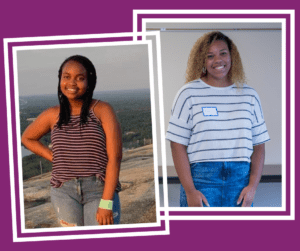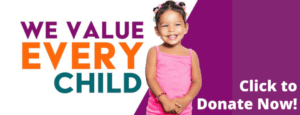In 2016, with the help of Youth Empowered Solutions (YES!), NC Child brought together a group of Wake County high school students who wanted to work together to advocate for themselves and their peers. That group had a huge impact on tobacco policies in Wake county schools, and helped propel statewide action to curb the impact of vaping on North Carolina teens. In 2019 the Wake County group grew to 8 members, and we launched a new chapter of youth advocates in Wayne County.
Two NC Child Youth Advocacy Council members agreed to share a bit about their experiences on the Youth Advocacy Council, and how we as adults can better support them to make change in their communities. We started the conversation by learning more about what motivates both of these Youth Advocacy Council members to be advocates for others.

Giovonnii Cromartie Nelson (right) is a junior in Wayne County who dreams of being an oncologist. She volunteers at the local hospital each summer, plays basketball and golf, and is part of Girl Scouts.
Angela Kasyoka (left) is a sophomore in Wake County who is involved in a wide array of service and volunteer activities, including serving as President of the Sophomore Class Council at her high school.
Angela: I used to live in Kenya, and I’ve seen that in my life, the effects of not having the same resources as another person. And so to see that also happening here in America, it saddens me that there’s not equal access for all.
Gia: The most important thing to me in my community is making sure that everyone has access to all the things that they need in life. Growing up, I’ve always been extremely blessed. I have two parents that are both school principals. And so I’ve been able to see both sides, you know, students who come from low-income areas and don’t always have food on their tables.
Why did you get involved in the Youth Advocacy Council?
Gia: I went in kind of blindly. I looked at the website and I didn’t really know what it was, and then I noticed that it was a lot of kids, there’s really no adults on the website. I’ve always wanted to be an environment where my ideas were supported in spite of my age, and so I thought this would be a good opportunity for that.
There are some times whenever it almost goes quiet, you know, because La-Mine is always like “What do you think, what do you think we should do, what are you seeing?” It’s never really, “Well, I think you guys should do this.” It’s always very open and up to us, and I appreciate that. [ed: La-Mine Perkins facilitates the Youth Advocacy Council.]
I’ve never been so directly involved in an organization like this before. There’s always been someone else in between. Or an adult telling us exactly what we need to do for them. It’s different, whenever we’re the ones coming up with everything. I’m having to look at things from a more adult perspective.
Angela: I’ve always been the kind of person who wants to make a change in the world. I want to do something that’s going to impact other people. After reading a little bit about what the Youth Advocacy Council was able to accomplish with e-cigarettes in the Wake County School tobacco policies, I was like ‘wow I’m 15, there’s still something that I can be doing to actually make an impact. I don’t have to be a politician or an adult, I can be doing things now.’ So I wanted to join because I wanted to do something now. I wanted to be able to actually make a change.
What does it mean to you to be an advocate?
Angela: Well I think a lot of people can say, I support not allowing e-cigarettes to be in the hands of youth, but you’re not necessarily going to do something about it. That’s what makes you an advocate. I think not just only having the idea of what you want to happen in your head, but also trying to actually solve the problems that are important to you. So that’s what I’m trying to do with Youth Advocacy Council. Trying to actually put a plan into motion and solve things rather than just sitting passively waiting for things to go by.
Gia: To be an advocate means to just continuously be aware of what’s going on in your community and to fight for those things that you feel are important. Do everything that you can to bring forth change and to work with the people around you who are working towards change. Just every day thinking about different ways that you can positively affect someone else’s life.
How could adults do better supporting youth as advocates?
Gia: One of the biggest things that adults can do is to listen, because they’re not always aware of what’s truly going on with each kid. So just providing a safe environment for us to know that we can come to an adult, and that we’re going to be taken seriously, and that our views are going to be valued.
Angela: I think that pushing the agenda more on social media more would be helpful. Allowing youth to know that these opportunities are available to them to actually seek change. A lot of youth do actually want to be advocates and make changes. For example, a lot of people that I know on Instagram are always talking about how there’s different issues that they want to solve, or re-posting things that they’ve seen that they’re angry about, that they want to be fixed, but they don’t understand that there’s actually things that they can be doing. Give them options that they can be doing, or telling them ways that they can go out into the community and make a change.
Who inspires you to advocate for others?
Angela: I don’t know if it’s cliché to say my parents… My parents are extremely hardworking people who have given back so much to their families and their communities. They have inspired me so much to want to do things for other people. They came to this country, they didn’t have a lot of money. They made money for themselves, and then they give so much of it back to help family and other people in the community. There’s a library that they fund there [in Kenya] that they get books for, they give clothes to the some of the kids living in the villages.
Growing up with that kind of influence in my life has definitely shaped who I am, definitely shaped me into somebody who wants to help other people. I know that that’s something that I want to be doing in the future. Anything involving helping people is just what I want to do.
Gia: I want to say both of my parents. My mom and my dad. I’ve gone my entire life, watching them make change in their communities. And just seeing the impact they have on the community and how many children they’ve reached over the years, I think it’s really cool and extremely important. They inspire me to not only do my best and be my best, but to be the best that I can for other people.
Fawn Pattison is NC Child’s Communications Director.
Support youth organizing! Contribute to NC Child’s year-end campaign and help us continue to grow the Youth Advisory Council.


